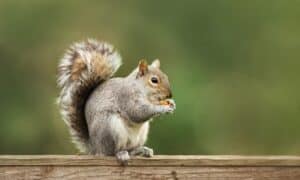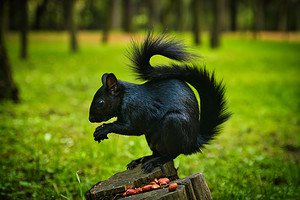Squirrels belong to the rodent family Sciuridae. The word ‘squirrel’ may actually refer to any member of this family–including prairie dogs, tree squirrels, ground squirrels, flying squirrels, chipmunks, marmots, and groundhogs. But, no matter what type of squirrel you’re talking about, they all have the same teeth.
Here, we’ll discover just why squirrels have such characteristic teeth, and what they’re used for. We’ll also learn a little more about some of the problems squirrels may run into with their teeth, and how rescue organizations diagnose and treat these issues.
What Kind of Teeth Do Squirrels Have?
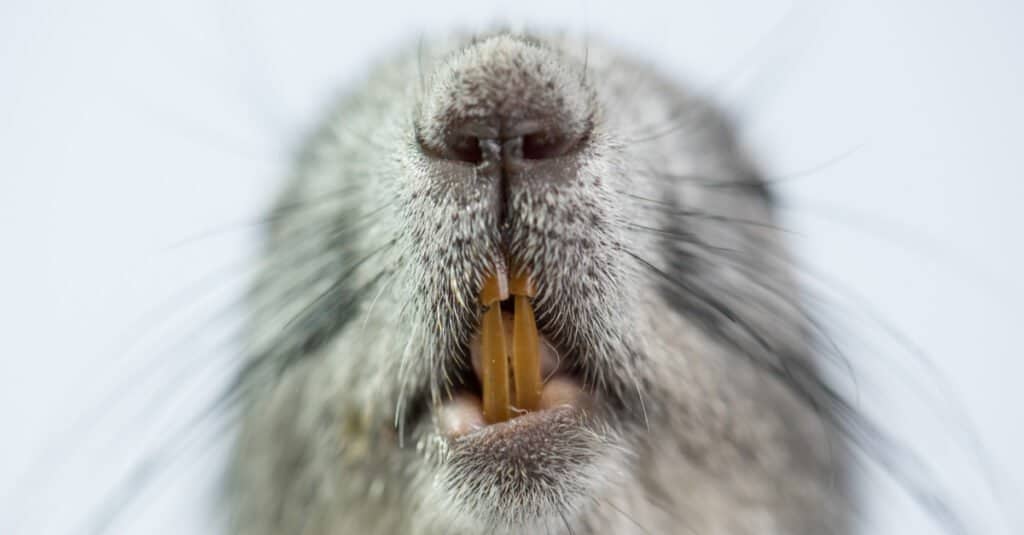
Squirrel teeth never stop growing.
©Puttinan Inchan/Shutterstock.com
Squirrels, like all members of the rodent family, have teeth that never stop growing. They’re called elodonts, which means (literally)–ever-growing teeth. Their teeth are covered in a hard layer of enamel. Beneath the enamel is a layer of cementum, and below that–the dentin, or pulp, of the tooth.
Squirrels’ molars look similar to human molars, and follow the pattern of enamel-cementum-dentin–they even have roots similar to human teeth. Squirrel incisors, however, have to grow at a very fast rate to keep up with their diets, and because of this, they look a little different than the molars and premolars (cheek teeth).
Squirrel incisors actually develop an enamel coating below the gumline. This enamel grows constantly, which allows the squirrel to wear down its incisors for its entire life without having to worry about losing them.
Do Baby Squirrels Have Teeth?
Squirrels are born toothless; their first teeth don’t erupt until they’re a couple of weeks old. These first baby squirrel teeth are deciduous (milk) teeth, and are eventually replaced by adult teeth.
How Many Teeth Do Squirrels Have?
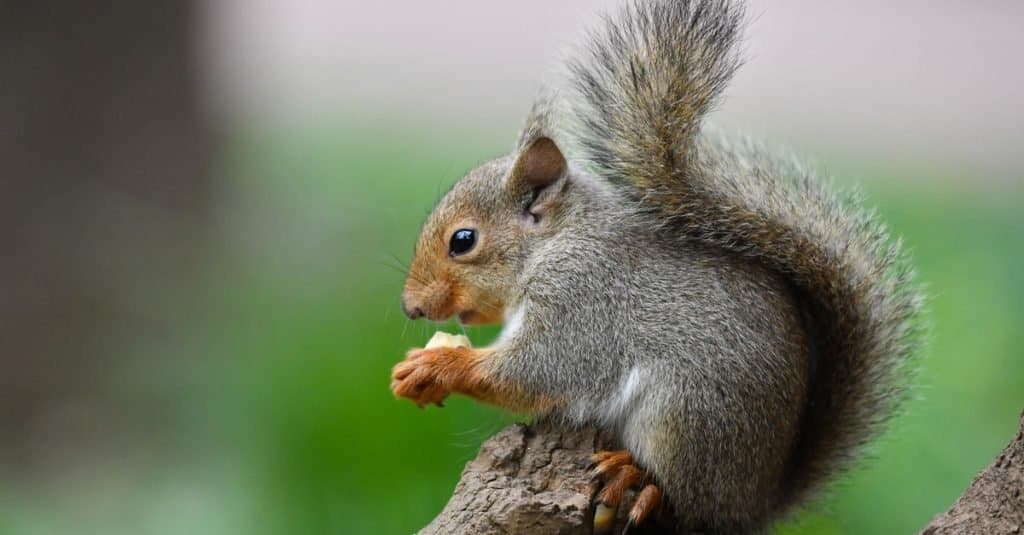
Squirrels have 22 teeth; four incisors, four premolars, and 12 molars.
©unUnlucky/Shutterstock.com
Squirrels have 22 teeth. The one exception to this is the Eastern gray squirrel, which has 24 teeth (two extra premolars). All other squirrel species have four incisors, four premolars, and 12 molars. Like all rodents, squirrels do not have canine teeth. Instead, they have a gap between their incisors and premolars called a diastema.
Incisors
Squirrels have four long, thin, chisel shaped incisors at the front of their mouth. These incisors are vital for gnawing, and it’s very important that the top and bottom incisors align properly. If they don’t, then they can’t rub against each other, and may become overgrown.
Squirrels’ bottom jaws (mandibles) are actually two separate bones; one on each side of the jaw. The mandibles are connected between the two bottom incisors by only one ligament. This may seem strange, but it actually allows the squirrel the flexibility it needs to move its bottom incisors from side to side for different tasks.
Premolars
Squirrels typically have four premolars. The premolars are nearly identical to the molars, and are often grouped together as ‘cheek teeth’.
Molars
All squirrels have 12 molars in addition to their four premolars. These teeth are not used to gnaw, rather, they’re used to pulp up the tough foods squirrels feed on. Squirrels have strong jaw muscles to go with their hefty molars; and thanks to a thick layer of enamel on the cheek teeth, they don’t have to worry about wearing them out.
What Do Squirrels Use Their Teeth For?
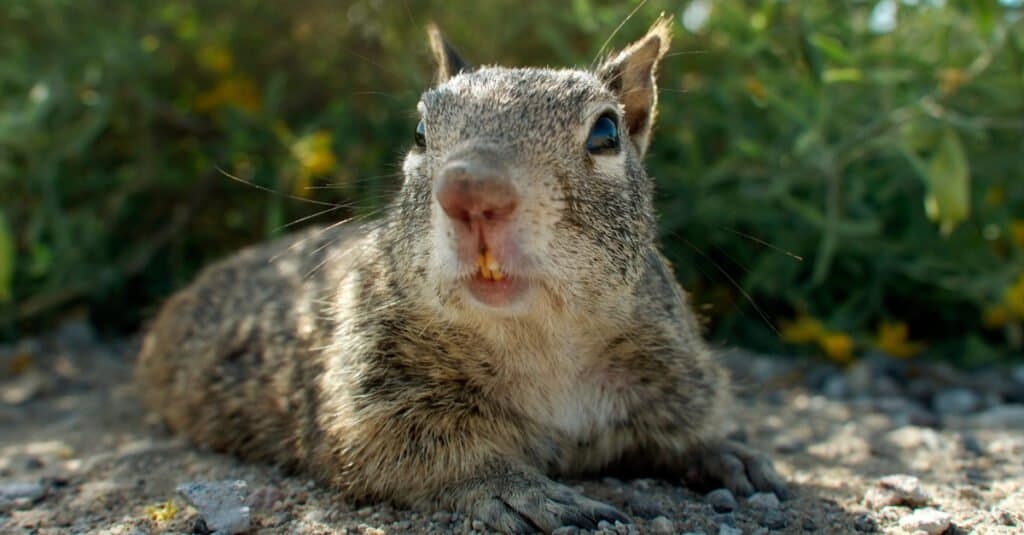
Squirrels’ teeth are naturally yellow or orange because of their thick enamel.
©Salty View/Shutterstock.com
Just why do squirrels have such specialized teeth? Well, for one–they love to gnaw. Gnawing is one of a squirrel’s primary activities; they have to gnaw if they want to get to the foods they need, and if they want to shred material for their bedding. But the incisors play one more significant role–self defense. Squirrels will defend their territory against other squirrels, and, more rarely, bite a human if they feel threatened or trapped.
Squirrels use their powerful cheek teeth to crack open the tough nuts, seeds, and conifer cones that they thrive on. Once they’ve cracked the shells, their specially suited molars make short work of the nutmeat or seed within.
Why Are Squirrels’ Teeth Orange?
One of the most recognizable characteristics of a squirrel is its bright orange (or yellow) front teeth; but just why are their teeth orange? Not to worry–squirrel teeth are meant to be orange; they’re only white in infancy. The orange color comes from the enamel that coats the teeth. The top incisors are often a darker color than the bottom ones. This is because the bottom incisors rest behind the front incisors–which means the enamel on the front wears away faster, leaving a lighter color.
Dental Problems
Squirrels may encounter dental problems, particularly with their incisors, at any point in life–but are particularly prone to issues as babies. This is because baby squirrels have oversized heads, and this puts them in increased danger of falling, sometimes from great heights. Falls often result in broken incisors, which, if the teeth grow back crooked, can lead to malocclusion.
Malocclusion and Overgrowth
Malocclusion (misalignment) of the incisors is the most common dental problem in rodents. If the incisors do not line up properly, they cannot wear correctly, yet they will continue to grow. This quickly leads to a condition called ‘overgrowth’, in which the squirrel rapidly loses the ability to eat, and, if untreated, may die.
Fortunately, many squirrel rescue operations exist to help out squirrels in need. Veterinary rodent specialists at these organizations can examine the squirrel, determine whether or not it has overgrown teeth, and administer proper treatment. This may include trimming or even extracting the squirrel’s teeth. It’s important to remember that squirrel dental care should only be performed by professionals; if you find a squirrel in need of help, do not attempt to trim its teeth yourself–you should contact a veterinary specialist.
Odontoma
Squirrels may also suffer from tumors in the tooth root of the upper incisors. These are called odontomas, and are caused by either traumatic injury (from falls) or from captive squirrels chewing cage bars when they’re young. Odontomas are lethal if left untreated. Fortunately, if caught early enough, odontomas can be treated by specialists.
The photo featured at the top of this post is © Puttinan Inchan/Shutterstock.com
Thank you for reading! Have some feedback for us? Contact the AZ Animals editorial team.




